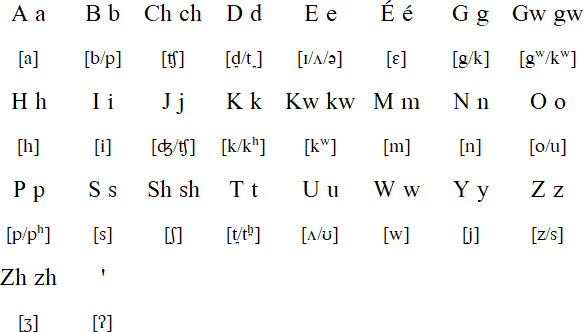Potawatomi is Algonquian language spoken in southern Ontario in Canada, and in Michigan, Indiana, Wisconsin and Kansas in the USA. In 2012 there were just nine elderly speakers. Efforts are currently being made by various bands of Potawatomi to revitalise and revive their language. There are about 28,000 Potawatomi and the call themselves Nishnabe'k ('the original people') or Bodéwadmi ('those who keep/tend the hearth-fire'), which refers to the hearth of the Council of Three Fires, a confederation of the Chippewa, Ottawa and Potawatomi peoples dating back to 796 AD.
Potawatomi is also known as Pottawatomie, and native names from the language are Bodéwadmimwen, Bodéwadmi Zheshmowen and Neshnabémwen
For many generations the Potawatomi used a pictographic form of writing in which each symbol represents ideas rather than words or sounds. The symbols were carved into bark or wood with a knife or other sharp tool. Sometimes charcoal or paint were used as well. This script was used for various purposes, including ceremonies, keeping records, maps and illustrating stories.
Between 1830 and 1860 two Jesuit missionaries, Fr. Christian Hoecken and Fr. Maurice Gailland, developed a spelling system for the Potawatomi using the Latin alphabet. The system is syllabic in that combinations of consonants and vowels are used to represent single syllables, e.g. ba, be, bi, etc. The system was known as the "ba-be-bi-bo-bu" syllabary.
Another spelling system known as "Traditional Writing" also appeared for a number of Native American languages during the 19th century. A version of this system for Potawatomi was developed in about 1878 by Joe Ellick, a Wisconsin Potawatomi to enable members of the tribe to write home when they were away.
During the 1970s a team of linguists, native speakers and second language experts at the Wisconsin Native American Languages Program (WNALP) developed a new spelling system for Potawatomi known as the Pedagogical writing system. This system was designed to teach the Potawatomi to speak their language and is shown below.

Source: http://www.potawatomilang.org/Reference/Grammar/Phonology/sounds.html
Download an alphabet chart for Potawatomi (Excel)
Source: https://www.bible.com/bible/135/MAT.6.POTL
Source: https://www.bible.com/bible/1/MAT.6.kjv
Information about Potawatomi | Numbers
Potawatomi Language information and resources
https://en.wikipedia.org/wiki/Potawatomi
http://www.native-languages.org/potawatomi.htm
http://www.neaseno.org/language.htm
http://www.potawatomilang.org
http://www.ku.edu/~kansite/pbp/talk/home.html
The Neshnabe Institute for Cultural Studies - promotes languages and culture of the Potawatomi and others: http://www.neaseno.org/
Potawatomi dictionaries
http://www.potawatomi.org/lang/our-language
Abenaki, Algonquin, Arapaho, Atikamekw, Blackfoot, Cheyenne, Chippewa, Cree (East), Cree (Moose), Cree (Plains), Cree (Swampy), Cree (Woods), Fox, Innu (Montagnais), Kickapoo, Malecite-Passamaquoddy, Loup, Massachusett (Wampanoag), Menominee, Miami, Míkmaq, Mohegan, Mohican, Munsee, Narragansett, Naskapi, Ojibwe, Oji-Cree, Ottawa, Penobscot, Powhatan, Potawatomi, Quiripi, Sauk, Shawnee, Unami (Lenape)
Languages written with the Latin alphabet
Page last modified: 17.10.24
[top]
You can support this site by Buying Me A Coffee, and if you like what you see on this page, you can use the buttons below to share it with people you know.

If you like this site and find it useful, you can support it by making a donation via PayPal or Patreon, or by contributing in other ways. Omniglot is how I make my living.
Note: all links on this site to Amazon.com, Amazon.co.uk
and Amazon.fr
are affiliate links. This means I earn a commission if you click on any of them and buy something. So by clicking on these links you can help to support this site.
[top]